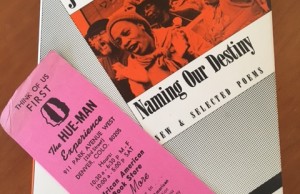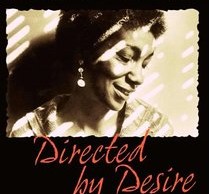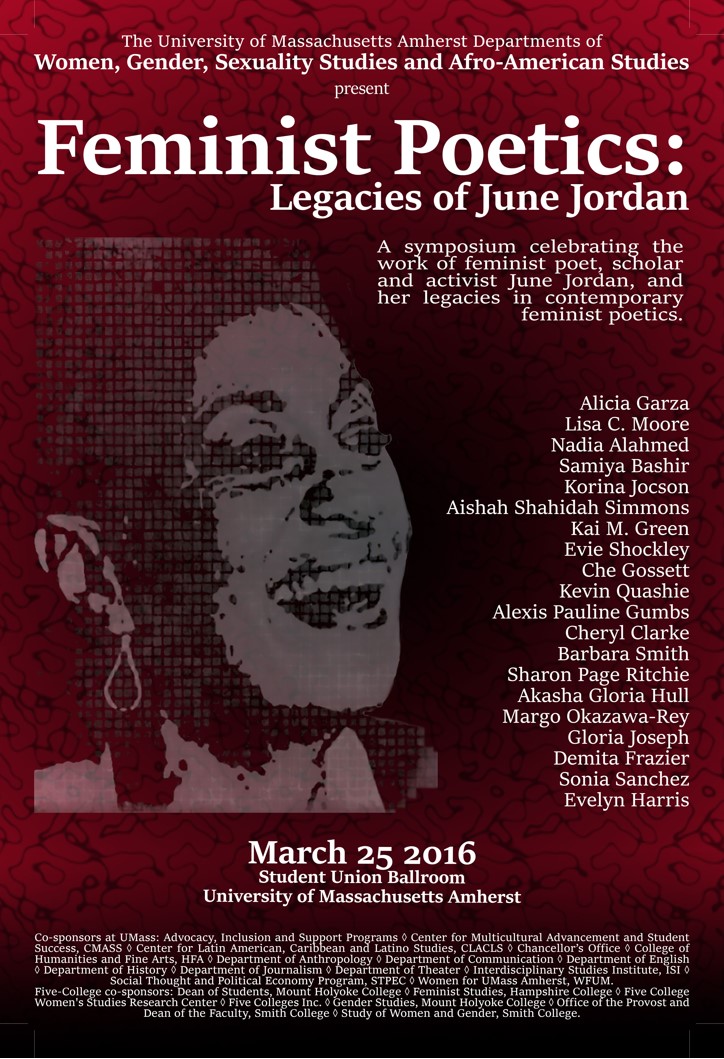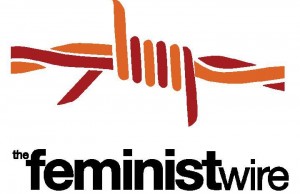“Naming Our Destiny”: Afterword to The Feminist Wire’s Forum on June Jordan
By Aishah Shahidah Simmons on March 25, 2016
Cover of Simmons’ personal copy of June Jordan’s “Naming Our Destiny: New & Selected Poems,” photo credit: Aishah Shahidah Simmons
I was first introduced to June Jordan’s words through the books on both of my divorced radical activist parents’ — Dr. Gwendolyn Zoharah Simmons and Michael Simmons — bookshelves when I was a young Black girl and teenager coming of age in the 1970s and 1980s. However, I “met” June Jordan in 1991 through sister award-winning filmmaker Pratibha Parmar’s classic and timeless film, A Place of Rage, which is an incredible cinematic tribute to prominent African-American women featuring, Angela Y. Davis, June Jordan, and Alice Walker‘s engaged activism. It was Parmar’s A Place of Rage, where I experienced and became enamored with this incredible out Black bisexual feminist poet, essayist, activist, and distinguished professor named June Jordan. At that time, I was twenty-two years old. I was not able to say that I was molested as a child by my paternal (step)grandfather over a period of two years. I was barely able to say that I was raped in my sophomore year in college. It was three-years before I began my eleven-year journey to make my feature length film NO! The Rape Documentary. And this Black woman poet/warrior/activist/professor called out the various manifestations of physical, sexual and political rape in her Poem About My Rights not only in writing (Directed by Desire and Naming Our Destiny: New & Selected Poems), but also on the screen in A Place of Rage. The entire poem consistently takes my breath away every single time I read the poem, or hear an online recording of her performing it, or see her read it in A Place of Rage. However, it’s the final third of the poem that always, always reverberates throughout the core of my body:
I am the history of rape
I am the history of the rejection of who I am
I am the history of the terrorized incarceration of
myself
I am the history of battery assault and limitless
armies against whatever I want to do with my mind
and my body and my soul and
whether it’s about walking out at night
or whether it’s about the love that I feel or
whether it’s about the sanctity of my vagina or
the sanctity of my national boundaries
or the sanctity of my leaders or the sanctity
of each and every desire
that I know from my personal and idiosyncratic
and indisputably single and singular heart
I have been raped
be-
cause I have been wrong the wrong sex the wrong age
the wrong skin the wrong nose the wrong hair the
wrong need the wrong dream the wrong geographic
the wrong sartorial I
I have been the meaning of rape
I have been the problem everyone seeks to
eliminate by forced
penetration with or without the evidence of slime and/
but let this be unmistakable this poem
is not consent I do not consent
to my mother to my father to the teachers to
the F.B.I. to South Africa to Bedford-Stuy
to Park Avenue to American Airlines to the hardon
idlers on the corners to the sneaky creeps in
cars
I am not wrong: Wrong is not my name
My name is my own my own my own
and I can’t tell you who the hell set things up like this
but I can tell you that from now on my resistance
my simple and daily and nightly self-determination
may very well cost you your life (102-103)
June Jordan is an ancestral Black feminist bisexual spirit whose radical anti-sexual violence work is one of the bedrocks of my own life’s work to break the silence and work towards ending the sexual violence committed against children, women and QTPOC (queer, trans* people of color).
Sista June’s words were also an integral part of my life’s musical soundtrack. I frequently hummed her words to the tune of Sweet Honey In The Rock® (SHITR) songs. Where would I be without SHITR founder Sista Dr. Bernice Johnson Reagon’s musical arrangement of Jordan’s poetic and lyrical words that have been my anthems for decades?:
Alla Tha’s All Right, But… (Seven Day Kiss) (1981)
[…] I been scheming about my people I been scheming about sex
I been dreaming about Africa and nightmaring Oedipus the Rex
But what I need is quite specific
terrifying rough stuff and terrificI need an absolutely one to one a seven-day kiss[…]
Oughta Be A Woman, (1981)
Washing the floors to send you to college
Staying at home so you can feel safe
What do you think is the soul of her knowledge
What do you think that makes her feel safe[…]The fathers, the children, the brothers
Turn to her and everybody white turns to her
What about her turning around
Alone in the everyday light[…]
We are the ones/Waiting for (1998)
We are the ones we’ve been waiting for
Sista June’s “Notes of a Barnard College Drop Out” (Civil Wars, 1975) was my lifeline in the “you’re a failure and you’ll never succeed in life” ocean that I was almost drowning in because I dropped out of both Swarthmore College and Temple University after my rape/consensual sex/pregnancy/safe and legal abortion at the ripe age of nineteen years-old in 1989.
And because Barnard College did not teach me necessity, nor prime my awareness as to urgencies of need around the world, nor galvanize my heart around the critical nature of conflicts between the powerful and the powerless, and, because, beyond everything else, it was not going to be school, evidently, but life-after-school, that would teach me the necessities for radical change, and revolution, I left. I dropped out of Barnard. It was, apparently, an optional experience.
And so I continue: a Black woman who would be an agent for change, an active member of the hoped-for apocalypse. I am somebody seeking to make, or to create, revolutionary connections between the full identity of my love, of what hurts me, or fills me with nausea, and the way things are: what we are forced to learn, to “master,” what we are trained to ignore, what we are bribed into accepting, what we are rewarded for doing, or not doing . . . (101)
 I never met Sista June and yet her words not only affirmed and comforted me time and time again most especially in the 90s, but they also provided road maps for my different paths that ultimately merged into one life’s journey. Initially unchartered territory for me, she traveled down these paths and left a trail from which I could learn and either follow or create my own.
I never met Sista June and yet her words not only affirmed and comforted me time and time again most especially in the 90s, but they also provided road maps for my different paths that ultimately merged into one life’s journey. Initially unchartered territory for me, she traveled down these paths and left a trail from which I could learn and either follow or create my own.
Throughout the six days of this celebratory forum, readers had an opportunity to hear from a range of intergenerational Black/Latin@, Arab, white, straight and queer activists, scholars, poets and cultural workers who knew Sista June personally or solely through her words. This online gathering represents a tiny sampling of all those whose lives have been influenced, impacted, ignited, inspired by June Jordan’s relentless and fiercely courageous activism. Mecca Jamilah Sullivan’s lyrical Introduction sets the tone for the forum. She informs the readers that this is an online praisesong soaked in love and respect for June Jordan.
It was a gift to publish love notes written by Margo Okazawa-Rey, Alexis De Veaux, and Evelyn C. White — three trailblazing, mapmaking Black feminist activists, authors and scholars who shared personal anecdotes about beloved Sista June.
[j]im saliba and Aya de Léon’s articles provide a glimpse of life as a student and friend in June Jordan’s “Poetry for the People” program at UC Berkeley and life as Jordan’s successor of the directorship of the “Poetry for the People” program ten years ago. Sista June’s words are the foundation from which Kimalee Phillips builds the contemporary case for radical activism against, and demanding (not asking for) accountability and justice against those structures and systems that marginalize and annihilate. Tamara Lea Spira, Mick Powell , r. erika doyle, and Alexis Pauline Gumbs each provide beautifully crafted personal, herstorical, political, and creative experiences through and with Sista June’s writings and activism. All of which highlight that June Jordan’s legacy is not stagnant but is very much alive and breathing life into contemporary moments.
 While almost all of the contributors made reference to Sista June’s non-negotiable stance against the Israeli occupation of Palestine, Darnell L. Moore, Therese Saliba, and Sumaya Awad each detailed some of the many ways Sista June was unwavering with her public acts of solidarity with Palestinian sisters and brothers through her writing about, and speaking up and out against the Israeli occupation of Palestine as early as the 1980s. Perhaps not directly but without question Sista June’s early pro-Palestinian activism was one of the precursors to the powerful “Black Solidarity with Palestine” organizing campaign, which led to over 1,100 Black activists, artists, scholars, students and organizations that signed the statement. I am one of the over 1,100 signatories. The solidarity statement, which is translated into Arabic, French, and German, draws parallels between white supremacist state sanctioned violence committed against Black people in the United States and settler-colonialist Israeli violence perpetrated against Palestinians in the occupied territories, “Palestinians living in Israel and the seven million Palestinian refugees exiled in Jordan, Lebanon, Syria and other countries in the region.” If Sista June were alive today, she would’ve been among the first to sign, if not co-organize, in tandem with the her younger comraders, this statement.
While almost all of the contributors made reference to Sista June’s non-negotiable stance against the Israeli occupation of Palestine, Darnell L. Moore, Therese Saliba, and Sumaya Awad each detailed some of the many ways Sista June was unwavering with her public acts of solidarity with Palestinian sisters and brothers through her writing about, and speaking up and out against the Israeli occupation of Palestine as early as the 1980s. Perhaps not directly but without question Sista June’s early pro-Palestinian activism was one of the precursors to the powerful “Black Solidarity with Palestine” organizing campaign, which led to over 1,100 Black activists, artists, scholars, students and organizations that signed the statement. I am one of the over 1,100 signatories. The solidarity statement, which is translated into Arabic, French, and German, draws parallels between white supremacist state sanctioned violence committed against Black people in the United States and settler-colonialist Israeli violence perpetrated against Palestinians in the occupied territories, “Palestinians living in Israel and the seven million Palestinian refugees exiled in Jordan, Lebanon, Syria and other countries in the region.” If Sista June were alive today, she would’ve been among the first to sign, if not co-organize, in tandem with the her younger comraders, this statement.
Kai M. Green and tourmalines’ collaborative artistic, sonic and poetic meditations are the final tribute in this six-day forum. They place Jordan’s ‘A Poem About My Rights’ as the foundation for their bridge with the past to contemporary realities of Black resistance, Black love and Black joy in the midst of white supremacist violence committed against Black people.
March 25, 2016 is the seventy-seventh birthday anniversary of another Black feminist ancestral spirit named Toni Cade Bambara. Given that Sistas Toni and June share a powerful herstory, it’s quite cosmic that The Feminist Wire (TFW) close this six-day online celebration of June Jordan’s life and legacy on Toni Cade Bambara’s birthday anniversary. Sista June is the third Black feminist ancestral spirit who was the focus of TFW online celebrations of their lives and legacies. Sista June’s contemporaries, colleagues in the SEEK City College Program in New York in the 1960s, and sista friends Toni Cade Bambara and Audre Lorde were the other two celebrants.
I won’t delve deep in this “peace,” but I definitely remember my teacher and big sistafriend Toni interrogating why so many of the radical activist/cultural worker/sistren who taught in the SEEK program had some form of dis*ease. Cancer cut Sistas Audre, Toni, and June’s physical lives in the prime of their lives in the 1990s and early 2000s. If Sista June were with us today, she would turn eighty years old on July 9, 2016. Sista Toni would be seventy-seven today and Sista Audre would’ve celebrated her eighty-second birthday on February 18, 2016. Their spirits and legacies still teach and inform.
 It is purely magical that Mecca Jamilah Sullivan, and her colleagues in Women, Gender, Sexuality Studies and Afro-American Studies at the University of Massachusetts, Amherst (UMass) are hosting “Feminist Poetics: Legacies of June Jordan,” a one-day symposium of great interest to students, faculty and the larger community, taking place at UMass on from 9:30 a.m. until 10:00 p.m. today –March 25th, 2016.
It is purely magical that Mecca Jamilah Sullivan, and her colleagues in Women, Gender, Sexuality Studies and Afro-American Studies at the University of Massachusetts, Amherst (UMass) are hosting “Feminist Poetics: Legacies of June Jordan,” a one-day symposium of great interest to students, faculty and the larger community, taking place at UMass on from 9:30 a.m. until 10:00 p.m. today –March 25th, 2016.
As Mecca wrote in her Introduction to this forum:
The [March 25th UMass symposium] will gather a broad, intergenerational group of important feminist thinkers that includes foundational writers and theorists Cheryl Clarke, Gloria Joseph, Sonia Sanchez, Evelyn Harris, Paula Giddings, and Combahee River Collective members Barbara Smith, Demita Frazier, Sharon Page Ritchie, Margo Okazawa-Rey, and Akasha Gloria Hull. These scholars will engage in rich conversation with emerging and established theorists, artists, and activists including #BlackLivesMatter co-founder Alicia Garza, Evie Shockley, Samiya Bashir, Kevin Quashie, Jennifer DeClue, Aneeka Henderson, Che Gosset, and my brilliant fellow TFW Editorial Collective Members Aishah Shahidah Simmons, Alexis Pauline Gumbs, and Kai M. Green, whose works, like Jordan’s, highlight the crucial connections between feminist inquiry, activism, and the arts.
All of the symposium proceedings will be live streamed and archived. You can view it in real time here. (The archived link will be available through this link: http://feministpoetics.blogspot.com/2016/03/livestream-available-here.html?m=1)
The forum intentionally precedes the one-day symposium. Make no mistake, however, this forum exists because of the symposium. This is a testament to Mecca’s tireless, love inspired visionary work in honor of June Jordan. As with everything at TFW, it takes a village to co-create a forum. Heidi R. Lewis, Mick Powell, Mecca Jamilah Sullivan, Tc Tolbert, Heather Turcotte, and I were the co-curatorial and co-editorial team behind this forum. We feel more like family in the most loving, healthiest, compassionately accountable, and non-oppressive version.
We reached out to many more people than those who are featured. Due to a variety of reasons, mainly being stretched too thin in this society that requires so much from those of us who believe in freedom and justice, many of the invitees weren’t able to contribute. I personally thank Sister/Friends/Comrades Heba A. Nimr for making the connection with jim saliba and Nadine Naber for making the connection with Therese Saliba. Nana Darkoa Sekyiamah from the Black Feminisms Forum (BFF)Working Group of the AWID (Association of Women in Development) 13th International Forum made the connection with Kimalee Philips. These connections were pivotal because the three aforementioned important voices were previously unknown to the co-curators/co-editors. Special thank you to TFW Editorial Collective Member Joe Osmudson for his twenty-fifth hour technical issues trouble shooting with the co-curators/co-editors.
 We are in the midst of a major fundraising campaign. TFW is an LLC that was co-founded by two Black feminist scholars— Dr. Tamura A. Lomax and Dr. Hortense Spillers. The owners (Tamura, Dr. Monica J. Casper, and Darnell L. Moore) do not make money off of the site. Everything we (the entire editorial collective and published writers) write, create, and publish, we do for free in our third and fourth shifts. No one is paid for the radical, intersectional, anti-racist, anti-sexist, anti-heterosexist, anti-transphobic, anti-imperialist, anti-settler colonialist feminist work that TFW has consistently published since its first article in January 2010. All of TFW’s archived and contemporary articles are readily accessible to anyone who has access to the internet. The traffic at TFW is so heavy that it requires paying for the same size server that a college or university would use. The major difference, however, is that TFW does not have an endowment or even a shoestring budget. TFW does not receive corporate funding nor does it accept ads from corporate entities, and that is intentional. S/He who controls the purse strings controls the vision.
We are in the midst of a major fundraising campaign. TFW is an LLC that was co-founded by two Black feminist scholars— Dr. Tamura A. Lomax and Dr. Hortense Spillers. The owners (Tamura, Dr. Monica J. Casper, and Darnell L. Moore) do not make money off of the site. Everything we (the entire editorial collective and published writers) write, create, and publish, we do for free in our third and fourth shifts. No one is paid for the radical, intersectional, anti-racist, anti-sexist, anti-heterosexist, anti-transphobic, anti-imperialist, anti-settler colonialist feminist work that TFW has consistently published since its first article in January 2010. All of TFW’s archived and contemporary articles are readily accessible to anyone who has access to the internet. The traffic at TFW is so heavy that it requires paying for the same size server that a college or university would use. The major difference, however, is that TFW does not have an endowment or even a shoestring budget. TFW does not receive corporate funding nor does it accept ads from corporate entities, and that is intentional. S/He who controls the purse strings controls the vision.
This is invisible, multi-racial, intersectional, feminist labor. We deeply appreciate if not love what we do for our readers and also for ourselves. However, the editorial collective cannot continue to operate this way and be well. We can no longer use our backs to be the bridge to TFW. It takes money to keep TFW up and running. Presently, this money is coming out of some of the very pockets of those who are also donating their time and labor, after their first and second paid shifts let alone family time, to keep the site up and running. I, on behalf of TFW, invite you to please consider both make a donation through our indiegogo campaign and equally as important, spread the word about our fundraising campaign. It takes a village and TFW is calling upon our global village for support so that we can, in the words of Sista June, name our destiny. Thank you.
I close my “peace” and this forum with award-winning and trailblazing Black woman poet and culture maven Patricia Spears Jones‘ words from a March 14, 2016 email to me about her friend and comrade June Jordan:
But most importantly [June Jordan] demands we struggle with love and rage –twins in that fight against oppression. She could do that because she had the best laugh ever and it came out of love.
The June Jordan Forum index:
Friday, March 18, 2016
- “These words/they are stones in the water”: Introduction to The Feminist Wire Forum on June Jordan by Mecca Jamilah Sullivan
- For June by Tamara Lea Spira
Monday, March 21, 2016
- Another world is possible for we are the ones we’ve been waiting for by Kimalee Phillip
- Love Note to June Jordan from Margo Okazawa-Rey
Tuesday, March 22, 2016
- June Jordan, Genre Fiction and Publishing for the People by Aya de Léon
- the oath by jim saliba
Wednesday, March 23, 2016
- learning to pronounce my own name (ode to June Jordan) by Mick Powell
- Defeat Will Be Detestable to Us by r. erica doyle
- June Jordan Solves the Energy Crisis: Love is Lifeforce by Alexis Pauline Gumbs
Thursday, March 24, 2016
- The Occupation Stole My Words: June Jordan Helped Me To Relocate Them by Darnell L. Moore
- June Jordan’s Songs of Palestine and Lebanon by Therese Saliba
- A Legacy of Resistance by Sumaya Awad
Friday, March 25, 2016
- Remembering June Jordan and Madonna’s ‘Borderline’ by Evelyn C. White
- A Conjuring Love Supreme: Love Note to JJ by Alexis De Veaux
- Ode to June Jordan’s ‘A Poem About My Rights’ by Kai M. Green and tourmalines
- “Naming Our Destiny”: Afterword to The Feminist Wire’s Forum on June Jordan by Aishah Shahidah Simmons
 Aishah Shahidah Simmons is an award-winning Black feminist lesbian documentary filmmaker, activist, cultural worker, writer and international lecturer. An incest and rape survivor, she is the creator of the Ford Foundation-funded, internationally acclaimed and award-winning feature length film NO! The Rape Documentary. Alice Walker, the Pulitzer Prize-winning author of The Color Purple, says, “If the Black community in the Americas and in the world would save itself, it must complete the work that [NO!] begins.” Simmons is the 2015-2016 Sterling Brown Professor of Africana Studies at Williams College. She is also a 2016-2018 Just Beginnings Collaborative Fellow. She has taught at and/or been an Artist-in-Residence at Temple University, Scripps College, University of Chicago, and Spelman College. Her essays and articles have been published in several anthologies including the recently released Dear Sister: Letters from Survivors of Sexual Violence anthology edited by Lisa Factora-Borchers and the forthcoming Queering Sexual Violence: Radical Voices from Within the Anti-Sexual Violence Movement anthology edited by Jennifer Patterson. Her cultural work and activism have been documented extensively in a wide range of media outlets including in a wide range of media outlets including The Root, Crisis, Forbes, Left of Black, In These Times, Ms. Magazine, Alternet, ColorLines, The Philadelphia Weekly, Tikkun, Ebony, National Public Radio (NPR), Pacifica Radio Network and Black Entertainment Television (BET). She has screened her work, lectured extensively, taught classes, and facilitated workshops and dialogues at colleges and universities, rape crisis centers, juvenile correctional facilities, and government sponsored events throughout the United States and Canada, and in countries in the Caribbean, Europe, Africa, and Asia. You can follow her on twitter @AfroLez.
Aishah Shahidah Simmons is an award-winning Black feminist lesbian documentary filmmaker, activist, cultural worker, writer and international lecturer. An incest and rape survivor, she is the creator of the Ford Foundation-funded, internationally acclaimed and award-winning feature length film NO! The Rape Documentary. Alice Walker, the Pulitzer Prize-winning author of The Color Purple, says, “If the Black community in the Americas and in the world would save itself, it must complete the work that [NO!] begins.” Simmons is the 2015-2016 Sterling Brown Professor of Africana Studies at Williams College. She is also a 2016-2018 Just Beginnings Collaborative Fellow. She has taught at and/or been an Artist-in-Residence at Temple University, Scripps College, University of Chicago, and Spelman College. Her essays and articles have been published in several anthologies including the recently released Dear Sister: Letters from Survivors of Sexual Violence anthology edited by Lisa Factora-Borchers and the forthcoming Queering Sexual Violence: Radical Voices from Within the Anti-Sexual Violence Movement anthology edited by Jennifer Patterson. Her cultural work and activism have been documented extensively in a wide range of media outlets including in a wide range of media outlets including The Root, Crisis, Forbes, Left of Black, In These Times, Ms. Magazine, Alternet, ColorLines, The Philadelphia Weekly, Tikkun, Ebony, National Public Radio (NPR), Pacifica Radio Network and Black Entertainment Television (BET). She has screened her work, lectured extensively, taught classes, and facilitated workshops and dialogues at colleges and universities, rape crisis centers, juvenile correctional facilities, and government sponsored events throughout the United States and Canada, and in countries in the Caribbean, Europe, Africa, and Asia. You can follow her on twitter @AfroLez.
You may also like...
All Content ©2016 The Feminist Wire All Rights Reserved




0 comments